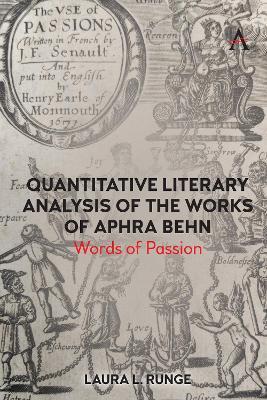Aphra Behn (1640-1689), a prolific and popular playwright, poet, novelist, and translator, has an extensive corpus of literature that plays a key role in literary history as the work of a female author. Based upon word counts, Quantitative Literary Analysis of the Works of Aphra Behn chronicles Behn's obsession with the mystery and power of love and early modern passions through her entire oeuvre. Love, for Behn, is an external power, sometimes figured as the boy god Cupid or an abstraction, that enters the body with pain and pleasure and leaves the victim searching for understanding. The book follows two threads of argument: one using quantitative measures to indicate passages for significant close reading of preferred language and the other focused upon her use of small words like thou, sir, or said. Situating her writings in the conflicts of Early Modern discourses on the passions, the book demonstrates that Behn's language reveals generic patterns for representing love that include a warning about its potential to destroy the body and condemn the soul. Taken as a whole, Behn's literary production is an extraordinary examination of the early modern concept of love at a moment of change in the language and meaning of the passions. Each chapter focuses on one type of writing: poetry, drama, and prose. Her poetry conjures love as an extremely powerful, disabling force, conveyed through the eyes, ears and hands, and acting on the heart and soul. The recipient of love's force is essentially passive except for the need to reflect and decide if the love is worthy or to regret the passion after abandonment. Language from the pastoral mode structures her love poetry; the shady greenery and responsive nature provide a context of ideal love in a golden age with the everlasting fulfilment of mutual desires or a suitably moody place to die. The physical progression of love remains the same in her drama: an external force entering the body with pain and sweet desire stimulating the power of reason to preserve honor and determine the quality of desire. The trail of betrayed lovers and broken vows in her comedies testifies to the prevailing force of love. In the dramatic context, love is unsurprisingly comic and active. Operating in the same way on the body, Behn's stage version of love is overblown, farcical and stagey. In her prose, the genre of writing most noted for her amatory style, Behn once again adopts the configuration of love as a powerful and mysterious ext









